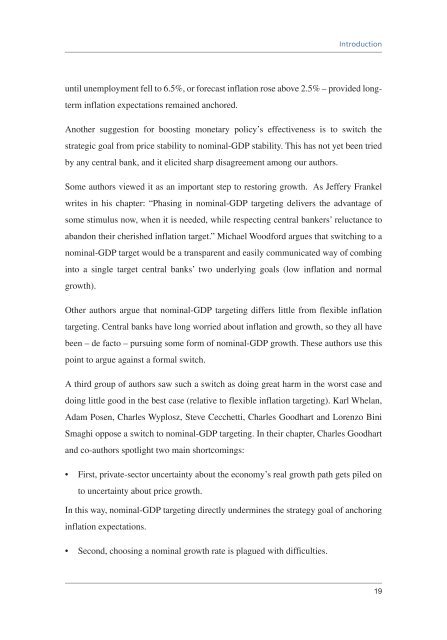Is inflation targeting dead? Central Banking After the Crisis - Vox
Is inflation targeting dead? Central Banking After the Crisis - Vox
Is inflation targeting dead? Central Banking After the Crisis - Vox
You also want an ePaper? Increase the reach of your titles
YUMPU automatically turns print PDFs into web optimized ePapers that Google loves.
Introductionuntil unemployment fell to 6.5%, or forecast <strong>inflation</strong> rose above 2.5% – provided longterm<strong>inflation</strong> expectations remained anchored.Ano<strong>the</strong>r suggestion for boosting monetary policy’s effectiveness is to switch <strong>the</strong>strategic goal from price stability to nominal-GDP stability. This has not yet been triedby any central bank, and it elicited sharp disagreement among our authors.Some authors viewed it as an important step to restoring growth. As Jeffery Frankelwrites in his chapter: “Phasing in nominal-GDP <strong>targeting</strong> delivers <strong>the</strong> advantage ofsome stimulus now, when it is needed, while respecting central bankers’ reluctance toabandon <strong>the</strong>ir cherished <strong>inflation</strong> target.” Michael Woodford argues that switching to anominal-GDP target would be a transparent and easily communicated way of combinginto a single target central banks’ two underlying goals (low <strong>inflation</strong> and normalgrowth).O<strong>the</strong>r authors argue that nominal-GDP <strong>targeting</strong> differs little from flexible <strong>inflation</strong><strong>targeting</strong>. <strong>Central</strong> banks have long worried about <strong>inflation</strong> and growth, so <strong>the</strong>y all havebeen – de facto – pursuing some form of nominal-GDP growth. These authors use thispoint to argue against a formal switch.A third group of authors saw such a switch as doing great harm in <strong>the</strong> worst case anddoing little good in <strong>the</strong> best case (relative to flexible <strong>inflation</strong> <strong>targeting</strong>). Karl Whelan,Adam Posen, Charles Wyplosz, Steve Cecchetti, Charles Goodhart and Lorenzo BiniSmaghi oppose a switch to nominal-GDP <strong>targeting</strong>. In <strong>the</strong>ir chapter, Charles Goodhartand co-authors spotlight two main shortcomings:• First, private-sector uncertainty about <strong>the</strong> economy’s real growth path gets piled onto uncertainty about price growth.In this way, nominal-GDP <strong>targeting</strong> directly undermines <strong>the</strong> strategy goal of anchoring<strong>inflation</strong> expectations.• Second, choosing a nominal growth rate is plagued with difficulties.19














